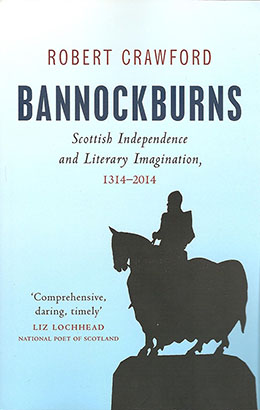To a yes?
 Robert Burns would have voted for Scottish independence, had he been around today, according to a leading Scots academic.
Robert Burns would have voted for Scottish independence, had he been around today, according to a leading Scots academic.
Renowned author and poet, Professor Robert Crawford, makes the claim in his new book ‘Bannockburns’, due to be published later this month (25 January 2014).
The new text, hailed as a ‘landmark’ study of the foundations of Scottish independence, is an examination of the impact of literature on the debate, covering Scots writing from as early as 1314.
The writer, a professor of Modern Scottish Literature at the University of St Andrews, came to his conclusion after a thorough examination on the Scottish bard’s letters and poems. Looking for clues that might indicate how Burns would feel about the referendum later this year, Professor Crawford believes that some of his poems were pro-union and his personal writings appeared to support Scottish independence. However, he is likely to have veiled his views to protect his employment as an excise-man to the Crown.
Professor Crawford, of the University’s School of English, said, “Towards the end of his life, Burns was effectively a civil servant. In other words, he was an employee of the crown, so he made loyal noises. I think you have to give far more credence to what Burns is under no obligation to say – and that is to attack the union.
“Even if you find other quotations from Burns that seem to be defending the union, you have to bear in mind that he was meant to do that because of the job the was doing at the time.”
Professor Crawford, author of ‘The Bard: Robert Burns, A Biography’, says poems such as Scots Wha Hae and Such A Parcel Of Rogues In A Nation are good illustrations of patriotic tendencies in the writings of Burns.
The former is written in the form of a speech given by Robert the Bruce before the Battle of Bannockburn in 1314 when Scotland maintained its sovereignty from England and the latter criticises members of the Scottish Parliament who signed the Act of Union with England in 1707.
In his argument, Professor Crawford cites a private letter written by Burns in 1790 that states: “Alas! Have I often said to myself, what are all the boasted advantages which my Country reaps from a certain Union, that can counterbalance the annihilation of her Independence and even her very Name?”
He continued, “I think the letter is one of the clearest pieces of evidence presenting Burns’s views on the union. He would have been risking his livelihood if he had said it noisily in a lot of public places. His loyalty to the crown might have been called into question and that would have been very dangerous.
The new book, which also explores the romantic ideals of freedom in the writing of Walter Scott and Scots Makar Liz Lochhead, as well as William Wallace and First Minister Alex Salmond, is described as a vital contribution to the independence debate.
Professor Crawford added, “I think he would vote yes. Burns is one of Scotland’s most important literary figures and he’s a pivotal figure because he doesn’t just write about Bannockburn with dewy eyes nostalgia. He was moving support for Scottish independence away from that Middle Age nostalgia and into the arena of modern democracy.”
The book also looks at St Andrews as a centre of Scottish nationalism in the 1930s, from the activities of flamboyant bisexual American Scottish nationalist James H. Whyte to the student career of Alex Salmond.
Professor Crawford, who is currently writing a biography of the poet T. S. Eliot, will launch ‘Bannockburns’ at Blackwell’s in Edinburgh on 23 January. He will then give a talk and reading entitled ‘Bannockburns: Robert Burns and Scottish Independence’ at the Netherbow Theatre, Scottish Storytelling Centre, 43-45 High Street, Edinburgh EH1 1SP at 2pm on Saturday 25 January.
ENDS
Issued by the Press Office, University of St Andrews
Contact Gayle Cook, Senior Communications Manager on Tel: 01334 467227, mobile: 07900 050 103 or email: [email protected]
Ref: To a Yes 100114
Category Research